
Friedrich August Gottreu Tholuck, known as August Tholuck, was a German Protestant theologian, pastor, and historian, and church leader.

Johann Salomo Semler was a German church historian, biblical commentator, and critic of ecclesiastical documents and of the history of dogmas. He is sometimes known as "the father of German rationalism".

Pietism, also known as Pietistic Lutheranism, is a movement within Lutheranism that combines its emphasis on biblical doctrine with an emphasis on individual piety and living a vigorous Christian life. It is also related to its non-Lutheran Radical Pietism offshoot that either diversified or spread into various denominations or traditions, and has also had a contributing influence over the interdenominational Evangelical Christianity movement.

August Hermann Francke was a German Lutheran clergyman, theologian, philanthropist, and Biblical scholar.
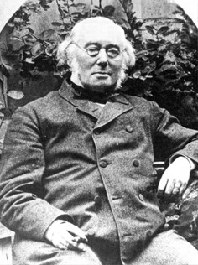
Albrecht Ritschl was a German Protestant theologian.

Philipp Jakob Spener, was a German Lutheran theologian who essentially founded what would become to be known as Pietism. He was later dubbed the "Father of Pietism". A prolific writer, his two main works, Pia desideria (1675) and Allgemeine Gottesgelehrtheit (1680), were published while he was the chief pastor in the Lutheran Church at Frankfurt. In 1691, he was invited to Berlin by the court of Brandenburg. Even in Berlin, Spener was at odds with the predominant Lutheran orthodoxy, as he had been all his life. Spener influenced the foundation of the University of Halle, but the theological faculty of another university, that of Wittenberg, formally accused him of 264 errors.

Christian Thomasius was a German jurist and philosopher.
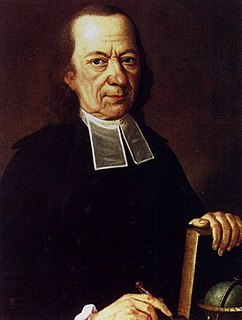
Friedrich Christoph Oetinger was a German Lutheran theologian and theosopher.

Friedrich Conrad Dietrich Wyneken was a missionary pastor in the United States. He also served for fourteen years as the second president of the Lutheran Church–Missouri Synod, and helped found Concordia Theological Seminary.

Gottlieb Christoph Adolf von Harless, was a German Lutheran theologian.

The Society for Promoting Christian Knowledge (SPCK) is a UK-based Christian charity. Founded in 1698 by Thomas Bray, it has worked for over 300 years to increase awareness of the Christian faith in the UK and across the world.

August Gottlieb Spangenberg was a German theologian and minister, and a bishop of the Moravian Church. As successor of Count Nicolaus Ludwig Zinzendorf, he helped develop international missions, as well as stabilized the theology and organization of the German Moravian Church.
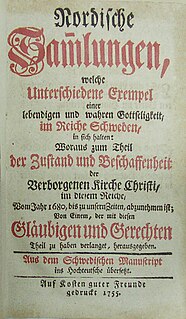
Radical Pietism are Pietists who decided to break with denominational Lutheranism, forming separate Christian churches. Radical Pietists contrast with Church Pietists, who chose to remain within their Lutheran denominational settings. Radical Pietists distinguished between true and false Christianity.. They separated from established churches to form their own sects.
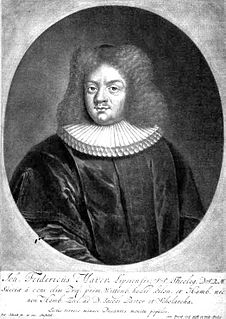
Johann Friedrich Mayer was a German Lutheran theologian and professor of theology at Wittenberg University. He was an important champion of Lutheran orthodoxy and General Superintendent of Swedish Pomerania.

Christian Friedrich Leberecht Strack was a German theologist, naturalist and writer. He wrote several collections of poems, translated classics into German including the works of Aristotle on animals which was published in several volumes as Naturgeschichte der Thiere.
Maximilian Mörlin was a Lutheran theologian, court preacher, Superintendent in Coburg, and Reformer.
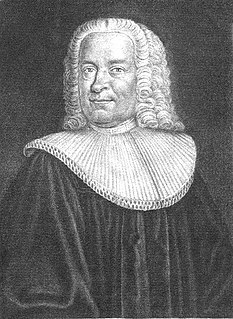
Samuel Urlsperger was a German Lutheran theologian with pietistic orientations.

John Christian Jacobi, also Johann Christian Jacobi, (1670-1750) was a German-born translator and dealer in religious books, particularly those connected with Halle Pietism. He served as keeper of the Royal German Chapel, St James's Palace from 1714 until his death.
Wilhelm Germann was a German Protestant theologian and missionary.
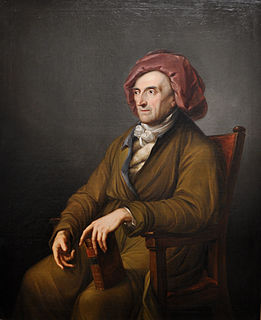
Johann Friedrich Wilhelm Jerusalem was a German Lutheran theologian during the Age of Enlightenment. He was also known as "Abt Jerusalem".

















